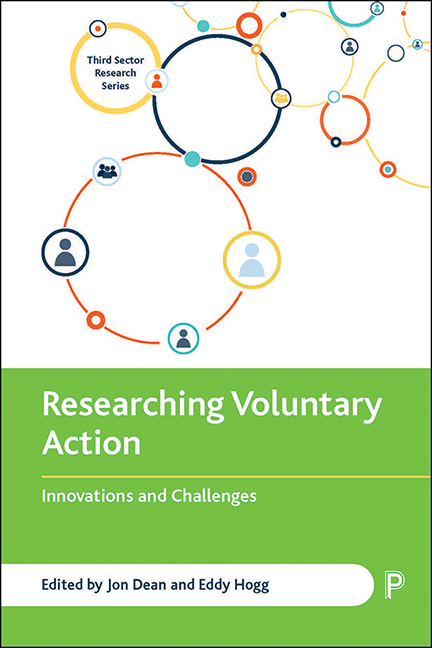Book contents
- Frontmatter
- Contents
- List of figures, tables and boxes
- Notes on contributors
- Acknowledgements
- Series editor’s foreword
- 1 Introduction
- 2 (Un)suitable methods and reflexive considerations: an interview and focus group study of youth volunteering
- 3 Interpretive ethnography: a UK charity shop case study
- 4 Collaborative philanthropy and doing practically relevant, critical research
- 5 Peer research: co-producing research within the context of voluntary and community action
- 6 Charity advertising: visual methods, images and elicitation
- 7 Using archives and objects in voluntary action research
- 8 Using Mass Observation as a source of qualitative secondary data for interdisciplinary longitudinal research on voluntary action
- 9 Investigating meanings and messages on volunteering through television media
- 10 Annual reporting in voluntary organisations: opportunities for content analysis research
- 11 Researching risk in the voluntary sector: the challenges and opportunities of regulatory data
- 12 Exploring the benefits of volunteering: combining survey and administrative data in the Nordic ‘laboratory’
- 13 Spatial approaches to the voluntary sector
- 14 Restudies, surveys and what counts as volunteering
- 15 Conclusion
- References
- Index
4 - Collaborative philanthropy and doing practically relevant, critical research
Published online by Cambridge University Press: 15 September 2022
- Frontmatter
- Contents
- List of figures, tables and boxes
- Notes on contributors
- Acknowledgements
- Series editor’s foreword
- 1 Introduction
- 2 (Un)suitable methods and reflexive considerations: an interview and focus group study of youth volunteering
- 3 Interpretive ethnography: a UK charity shop case study
- 4 Collaborative philanthropy and doing practically relevant, critical research
- 5 Peer research: co-producing research within the context of voluntary and community action
- 6 Charity advertising: visual methods, images and elicitation
- 7 Using archives and objects in voluntary action research
- 8 Using Mass Observation as a source of qualitative secondary data for interdisciplinary longitudinal research on voluntary action
- 9 Investigating meanings and messages on volunteering through television media
- 10 Annual reporting in voluntary organisations: opportunities for content analysis research
- 11 Researching risk in the voluntary sector: the challenges and opportunities of regulatory data
- 12 Exploring the benefits of volunteering: combining survey and administrative data in the Nordic ‘laboratory’
- 13 Spatial approaches to the voluntary sector
- 14 Restudies, surveys and what counts as volunteering
- 15 Conclusion
- References
- Index
Summary
Introduction
The purpose of this chapter is to draw on experience doing collaborative philanthropy research, specifically on giving circles or giving collaboratives (GCs), to argue for doing practically relevant and critical research despite the potential challenges, such as philosophical and political tensions.
GCs are collaborative forms of philanthropy in which members pool donations and decide together where these are given. They also frequently include social, educational and engagement opportunities for members, connecting them to their communities and to one another (Eikenberry, 2009). One example of a US-based GC is Washington Womenade, which holds regular volunteer-organised potluck dinners where attendees donate $35 to a fund that provides financial assistance to individuals (primarily women) who need help paying for things like prescriptions, utility bills and rent. In 2002, a Real Simple magazine story (Korelitz, 2002) on Washington Womenade led to the creation of dozens of unaffiliated Womenade groups across the country. This article also inspired Marsha Wallace to start Dining for Women, which is now a national network of more than 400 chapters across the US in which women meet for dinner monthly and pool funds they would have spent eating out, to support internationally based grassroots programmes helping women around the world. Another example of a GC in the UK is BeyondMe. It started in 2011 in London, made up of small groups or teams of young professionals affiliated with a particular corporation (for example, Deloitte or PwC) who select a charity or social enterprise with which to partner for the year, providing funding and professional pro bono support. Members of the team give £15 per month, with total funding to the beneficiary organisation amounting to between £3,000 and £5,000, and volunteer support of around 150 hours. Beneficiary organisations supported in the past include those helping jobless young offenders, homeless youth, women who have experienced abuse and sexual exploitation, and street and other marginalised youth, helping them to build businesses.
It is impossible to say how many GCs exist, because of their grassroots nature; however, by many indications they are growing in number around the world. Dean-Olmsted, Benor and Gerstein (2014) estimate that one in eight American donors have participated in a GC. An increasing number of GCs operate in Canada, Japan, South Africa, Australia, India, China, Japan, Romania, Bulgaria, the UK, Ireland and elsewhere.
- Type
- Chapter
- Information
- Researching Voluntary ActionInnovations and Challenges, pp. 36 - 45Publisher: Bristol University PressPrint publication year: 2022



